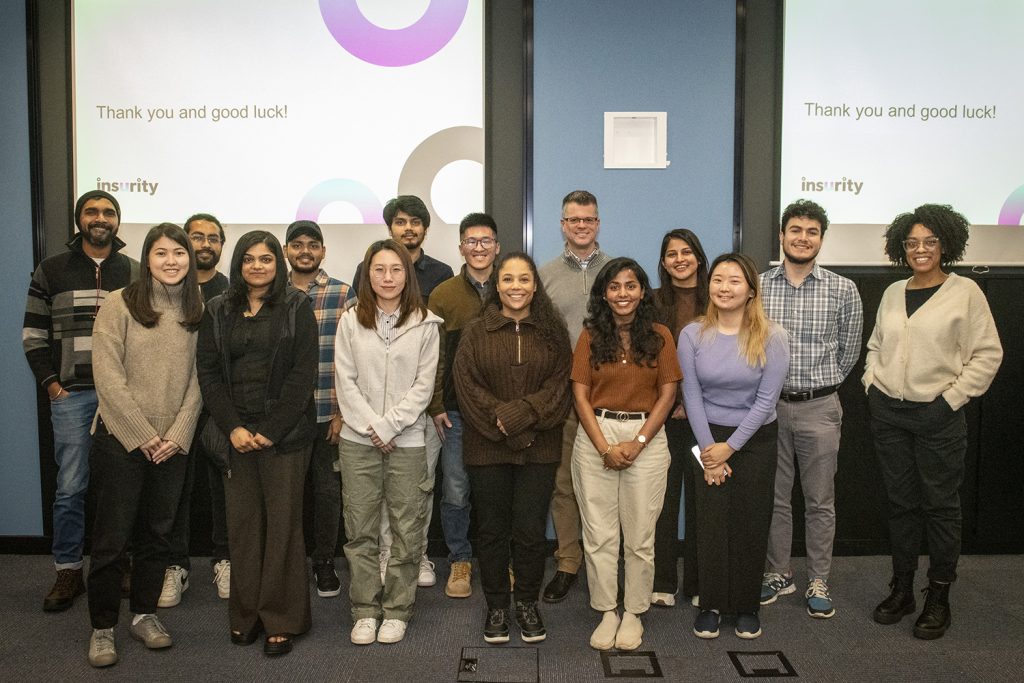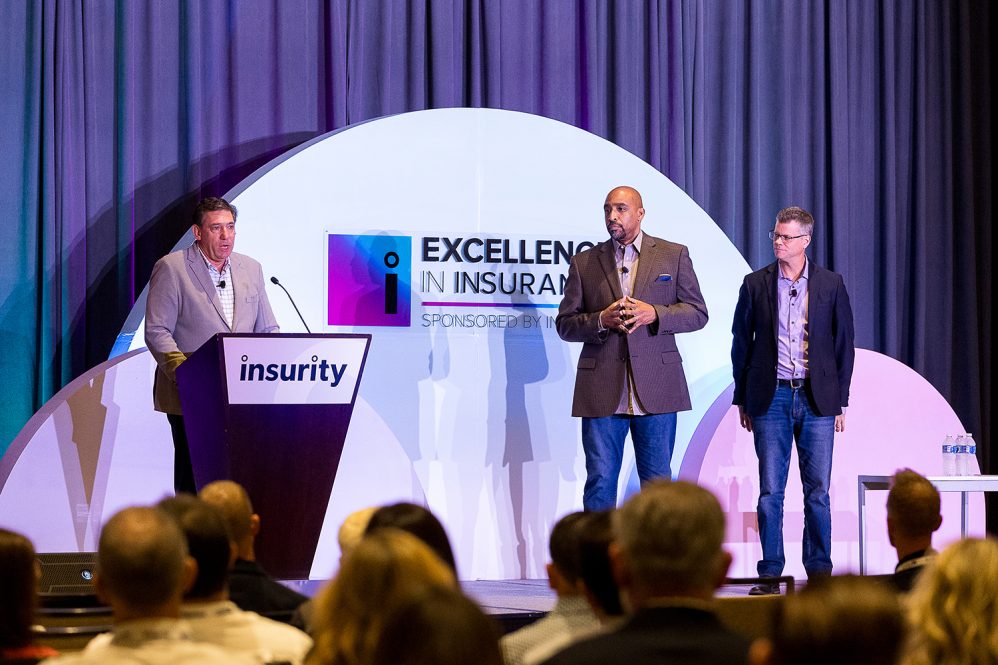Long before Chris Lafond ’87 (CLAS) became the CEO of Insurity, a $350 million software company headquartered in Hartford, he was trying to figure out the best strategy to develop and showcase his business abilities.
He quickly discovered the importance of being inquisitive and developing knowledge beyond what is expected.
“It isn’t enough to just be good at one thing,’’ Lafond told UConn business students recently. “Don’t wait to be trained or to be taught. The people who succeed have a broad knowledge of about their company and how it works. If I could impress upon you one lasting lesson, it would be to take ownership of your careers.’’
Lafond and other top executives at Insurity recently volunteered to share their career-building knowledge and advice with dozens of graduate students during a series of weekly leadership presentations. Some 30 students attended regularly.
“We all wanted to give back to the school and help students have a smooth transition to the workforce,’’ he says. “Our team understands the value in sharing what they do with the next generation. It wasn’t difficult to get them to participate.’’
The Insurity team discussed everything from business strategy to the growing importance of technology, how to boost employee retention and how to resolve important issues when the team doesn’t agree. The presentations also featured a question-and-answer session with executives, during which no question was off limits.
Rare Chance to Probe the Nuances of Business
Laurissa Berk, program liaison and the director of global & experiential education for graduate-business STEM programs, says the Insurity executives’ insight was greatly appreciated by the students.
“The opportunity to be mentored by the CEO of a large company is extremely powerful. Having access to the expertise of an entire C-suite is a unique opportunity to understand the nuances of business that few students get to explore,’’ Berk says. “Our students took full advantage. Discussions were lively as students received the behind-the-scenes scoop on management, decision-making, buy-in and strategy.’’
“We are very grateful to the Insurity team for their investment in and dedication to our students and their professional development. This commitment to providing essential leadership skills is just one of the many differentiators of a UConn Business education,’’ she says.
Trust is a Critical Component of a Successful Team
Brenda Burns ’88 (CLAS), Vice President at Insurity, spoke with students about the importance of conflict resolution among leadership.
“How well a team meshes and trusts each other is critical to a company’s success,’’ she says. “You want to have healthy conflict that highlights challenges and allows the team to solve those problems together. If you don’t, it’s a detriment to the entire business. It takes time to settle these things, so that everyone feels heard and supports the decisions and direction that the organization is taking, but it is an important part of the process.’’
Burns says the UConn-Insurity leadership series was beneficial for all.
“The students I had the privilege of meeting asked great questions and were all knowledge seekers,’’ she says. “We love new perspectives here and the crosshatch of ideas. We told them no question is off-limits. No one held back.’’

Burns also emphasized to the students that no task is too small when you’re new to the workplace.
“Sometimes people don’t want to pay their dues, and think that somehow all good things should just come to them,’’ says Burns, whose first job at age 12 was working in the tobacco fields. “But everything is a learning opportunity.’’
When Burns worked at her first job in insurance, handling administrative tasks, a senior vice president noticed how hard she worked.
“That experience opened other doors. She recognized my capability and recommended me for other things. Ultimately, I got tremendous exposure to other leaders,’’ she says. Lafond agreed, saying early in his career, although he worked in finance, he asked to listen in on sales calls to gain a deeper understanding of the business.
“One of the things that’s unique about our executive leadership team at Insurity is the enormous emphasis on growing and investing in our employees’ careers,’’ Burns says of the company with 1,300 employees in the U.S. and abroad. “We’re proud of that culture.’’
Innovation, Analytics Are Essential Today
Kirstin Marr, Chief Data Analytics Officer, spoke about the skyrocketing demand for data and data scientists. The U.S. Bureau of Labor Statistics is predicting a 28% growth in data analytics jobs between now and 2026.
“The need for data scientists and massive amounts of data is just exploding,’’ she says. “Predictive modeling, machine learning, and artificial intelligence are here to stay,’’ she says, adding that the information must be centralized, accessible, trustworthy and well-governed.
“Executives must have confidence in the information they’re using, so the business can make sound decisions,’’ Marr says. “What’s exciting for these students is that being new to the workforce isn’t a detriment for them because there is such a need for their skills. They’re not competing with someone who has been in the field for 30 years.’’
Marr, who began her career as an English literature major with plans to work in publishing and magazines, advised students that every career is a winding road. A job at HomeAdvisor introduced her to e-commerce and she developed skills in consumer search, brand development, business-to-business development and reputation management, all setting the stage for her current role.
Avoid companies that are just using the buzz words and pursue companies that explain how you can have a direct impact on their growth, she advises.
“If you like to build things, as I do, this is the most innovative time. The possibilities are endless,’’ she says. “We’re always looking for self-starters, motivated and purpose-driven people. I tell students to let their purpose shine through. It’s a great time to be entering business because there is so much need and so much opportunity.’’
What Does the CEO Do?
Lafond says his most important task as CEO is identifying the company’s top five goals.
“As CEO, I need to prioritize what we’re doing as a company, and what we’re not going to do. There are more good ideas than you can pursue, and if you try to do them all, you’ll be mediocre because you can’t do them all at once,’’ says Lafond, who is a member of the School of Business Hall of Fame.
He also devotes time to making sure his teams have the right members and chemistry to be successful, and making sure employees are valued, listened to, and understood. He will explain a decision or a policy 20 times, in small groups, large groups, and emails, to make sure his employees understand why changes are being made.
“A lot of senior executives don’t take the time to do that. If you don’t explain decisions or why you’re taking a particular direction, your employees won’t come on the journey with you,’’ says Lafond, who also pens thank-you notes to employees who excel.
For Students: ‘A Worthwhile Journey’
Lakeesha Brown ’24 MBA, the Interim Chief Human Resources Officer for UConn and the Vice President of Human Resources for UConn Health, participated in the Insurity leadership program and says the series gave her a different perspective.
“I was able to ask questions about how they got into their careers and what brought them to the C-Suite,’’ she says. “For me that is exciting and interesting information that helps me understand what motivates the candidates I am interviewing for senior-level positions.’’
Samarth Sharma ’24 MSBAPM, says the sessions were helpful to him, particularly those that focused on leadership and strategic vision.
“My career has spanned roles where bridging the technical and managerial divide was paramount, similar to the interdisciplinary approach I observed among the Insurity leaders,’’ says Sharma, a serial entrepreneur.
“It was compelling to see how these executives navigate the complexities of the tech and business worlds, offering actionable insights that I can apply to my career journey,’’ he says. “The series has been a worthwhile journey, greatly enhancing my understanding of the executive mindset and business strategy.’’



